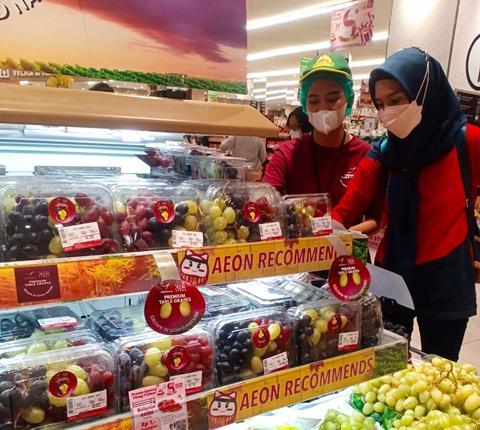Government issues first horticulture import permits for 2024 after lengthy delay

The Indonesian government has issued the first import permits for horticulture products in 2024 after a five-week delay which has impacted shipments from key supplying countries and contributed to a shortage of imported fruits for the Lunar New Year sales period.
The first horticulture import permits were issued on 2 February, allowing 2024 trade to commence, according to a source from the Australian Embassy in Jakarta.
One leading Indonesian fruit importer confirmed his company received an import permit on 2 February and took its first airfreight shipment of Australian grapes around a week later. “The import permits have been very late to release this year – it’s taken almost a month and a half,” he told Asiafruit. “At last, we can continue our business again.”
Nevertheless, the importer noted that permits were being “released slowly”.
Under Indonesia’s import process for horticulture products, importers must apply for an import licence from the Ministry of Agriculture known as a Recommendation to Import Horticulture (RIPH). Once they receive this licence, they can apply to the Ministry of Trade for import permits. Importers apply to import a certain volume by commodity, supply country and arrival port over a set time-period.
Lunar New Year supply shortage
The delay in issuing import permits has affected all Indonesia’s trading partners and comes after only a limited number of permits (quotas) were issued towards the end of 2023. This has resulted in a shortage of imported fruits for the Lunar New Year sales period in Indonesia. Supply of fruit from Thailand and China has been worst affected, according to the importer.
“The biggest shortage is on longan from Thailand, followed by ponkan mandarins and Fuji apples from China,” he said. “There has also been a shortage of Tasmanian cherries for Lunar New Year, but that’s because of weather [issues] rather than the import quotas.”
Relief for suppliers
Australian table grape growers and shippers are breathing a sigh of relief that trade can resume as Indonesia is the industry’s second largest export market. With the season well under way, the industry had yet to ship any fruit to Indonesia as of the end of January, according to Australian Table Grape Association CEO Jeff Scott, who said the situation was causing “distress for a number of growers”.
Australia shipped around 22,000 tonnes of grapes to Indonesia in 2022, according to data from the Asiafruit Congress Statistics Handbook 2023, representing some 18 per cent of the industry’s total grape exports and 9 per cent of Australian production.
The delays in issuing agriculture import permits have affected a range of Australia’s agriculture industries, most notably the live cattle and meat trade. Australia is Indonesia’s largest supplier of live cattle, with annual shipments of around 400,000 animals worth A$400m (US$240m) in recent years, according to Reuters.
Washington apple exports to Indonesia have also been impacted by the import permit delays. “We could not ship any fruit for two or three weeks during January,” said Todd Fryhover, president of the Washington Apple Commission. “That probably amounts to around 50,000-70,000 boxes we could not send. It’s frustrating, but we’re back shipping now and we’ve sent about 29,000 boxes over the past two weeks.”
Washington apple exports to Indonesia stood at around 335,000 cartons (18kg) in the season to date at the end of January, up 43 per cent on the same point last year, when the industry had a very small crop. Production is forecast to rebound to 140m cartons in 2023/24, which would mark the second-largest crop on record, and the industry is hopeful of recovering ground in Indonesia this year.
“We shipped a total of 592,972 boxes to Indonesia last year, which was down 22 per cent on the year before (762,574 boxes), so we’re hoping to get back up to 600-700,000 boxes this year,” said Fryhover.
The import permit delays have coincided with the build-up to Indonesia’s general election. Indonesian voters are heading to the polls on Wednesday (14 February) for what will be the world’s largest single-day election, with more than 200m people expected to vote.
The world’s third-largest democracy and fourth-largest population – home to more than 275m people – will elect a new president and vice-president from three pairs of contenders as well as choosing executive and legislative representatives at all administrative levels. The three candidates include defence minister and former army general, Prabowo Subianto; former Central Java governor, Ganjar Pranowo; and former Jakarta governor Anies Baswedan.



